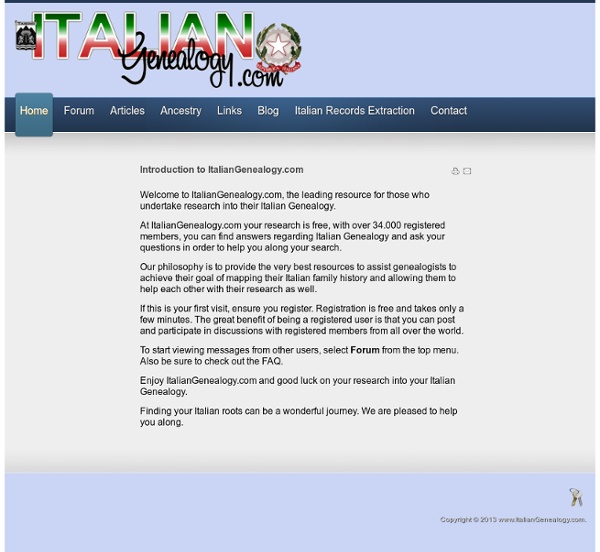



Italian Heritage and Genealogy D'Addezio.com Retrouvez instantanément toutes les personnes de votre arbre dans notre bibliothèque de livres et journaux anciens La presse généalogique a évoqué récemment une nouvelle fonction, annoncée avec tambours et trompettes par un site de généalogie étranger : la comparaison de toutes les personnes de votre arbre avec les noms mentionnés dans des journaux ou ouvrages anciens, Cette fonction très performante existe aussi sur GeneaNet : retour sur son usage et mode d'emploi. 1/ Contenu a) Les ouvrages anciens Accessibles uniquement et gratuitement aux membres du Club Privilège, ces ouvrages sont pour la plupart tombés dans le domaine public. Tous ne sont d’ailleurs pas hébergés par GeneaNet, mais nous avons extrait de ces ouvrages tous les noms cités, ce qui représente une source souvent inédite. b) Les ouvrages contemporains Il s’agit d’une collection payante et donc accessible à tous de la même façon (Privilège ou non Privilège), après achat d’un pack de « points » que l’on dépense à la page. d) Presse ancienne Est-il vraiment utile de présenter la richesse incomparable des journaux d'époque ? 2/ Fonctionnement
Généalogie - Actes en ligne Relevés, Actes, Généalogie, Histoire : Bénévoles et Associations - France Départements Les héros maritimes français de la première guerre mondiale 04 - 05 - 06 -13 - 83 - 84 - Relevés (site de Didier Verlaque) GeneaFrance ou "Les papiers de France" et GenéaPass : Excellents sites de France Apprill et Serge Busiau Normes et standards en généalogie : Incontournable ! Sites publiant des actes ou des tables avec ExpoActes 11.572.468 publiés à ce jour GeneActes Relevés Généalogiques Alliance - Généalogie : Relevés et bases de données Mode d'emploi GeneaBank 30 Millions d'actes disponibles sur GeneaBank Recherche libre mais accès à l'intégralité des actes en adhérant à une association. Forums Listes des Forums sur FranceGenWeb Listes des Forums sur FDA (Fil d'Ariane) Autres Pays Recherches à l'étranger sur GénéaPass - Un excellent site, indispensable pour vous guider CAOM Centre des Archives d'Outre Mer Liste de la Numérisation des Registres Gratuit et payant Aide à la recherche Sépultures de Guerre RamCal
Italian Genealogy S i t e M a p Genealogy Surname Boards & Searches This Surname Board List has hand-picked links to most of the popular Italian Genealogy Surname Message Boards where you can search and post your Italian surname originating in any of the municipalities / comunes of Italy. General Genealogy Boards & Lists are also included when they contain a good amount of Italian Surnames. You will also find sites that list Italian Surnames that are to be found in or originated from a particular Town and/or Region in Italy to help you in your Italian Family Tree Search. Mes racines en Vénétie APELLIDOS ITALIANOS - Batch Numbers de Italia Datos obtenidos de www.familysearch.org El sitio FamilySearch ofrece también, como recurso de investigación, la posibilidad de consultar en Internet la transcripción de los datos fundamentales de una considerable cantidad de partidas de nacimientos y matrimonios. El Batch Number es el número de lote que identifica a la colección específica de los registros históricos que se extraen de una parroquia y que se hallan dentro del microfilm. Se considera un lote a la documentación microfilmada en un lugar y fecha específicos. Los "Batch numbers" fueron recopilados a través de un Programa de Extracción de Datos que se realizó hasta el año 1991, aproximadamente, con el objetivo de elaborar un índice que facilitara las búsquedas. La recopilación se realizó fundamentalmente gracias al trabajo de voluntarios que relevaban los datos de los libros microfilmados, y a la vez controlado por supervisores, para evitar errores. Cómo utilizar estos "batch numbers"
Généalogie en Italie Il était important de consacrer une page à la généalogie en Italie car entre 3 et 4 millions de Français ont au moins un parent d'origine italienne. Italie : Un peu d'histoire... Divisée en plusieurs Etats (Savoie, Piémont-Sardaigne...), l'Italie est en grande partie annexée par Napoléon.1815 : Les anciennes monarchies sont rétablies.A partir de 1815, suite au congrès de vienne, l'Italie se retrouve sous la coupe de l'Autriche. L'idée d'une unité italienne commence à faire son chemin : c'est le début du Risorgimento.1859 : Victor-Emmanuel II, roi de Piémont-Sardaigne, libére la Lombardie occupée par les autrichiens.1860 : Les populations d'Italie centrale insurgées depuis 1859 votent leur réunion au Piémont. 1861 : Le royaume d'Italie est proclamé avec Turin, puis Florence (en 1865) comme capitale.1870 : L'unité italienne est achevée.1871 : Rome devient capitale. A noter, qu'en contrepartie de son appui, la France reçoit Nice et la Savoie en 1860. L'émigration italienne Après 1866 Avant 1866